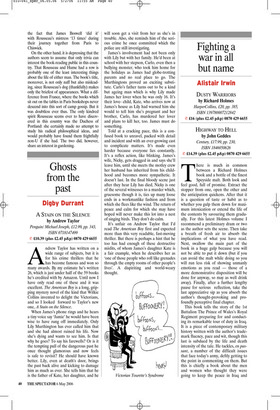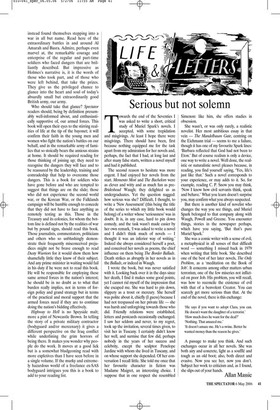Fighting a war in all but name
Alistair Irwin
DUSTY WARRIORS by Richard Holmes HarperCollins, £20, pp. 385, ISBN 139780007212842 ✆ £16 (plus £2.45 p&p) 0870 429 6655 HIGHWAY TO HELL by John Geddes
Century, £17.99, pp. 230, ISBN 1846050626
✆ £14.39 (plus £2.45 p&p) 0870 429 6655 There is much in common between a Richard Holmes book and a bottle of the finest Speyside malt. Both look and feel good, full of promise. Extract the stopper from one, open the other and the anticipation quickens. After that it is a question of taste or habit as to whether you gulp them down for maximum intoxication or extend the life of the contents by savouring them gradually. For this latest Holmes volume I recommend a preliminary dram or two as the author sets the scene. Then take a breath of fresh air to absorb the implications of what you have read. Next, swallow the main part of the book in a huge gulp because you will not be able to put it down (but if you can avoid the malt while doing so you will run less risk of showing unmanly emotions as you read — those of a more demonstrative disposition will be done for anyway, so may as well drink away). Finally, after a further lengthy pause for serious reflection, take the last appreciative sip as you absorb the author’s thought-provoking and profoundly perceptive final chapter.
This book tells the story of the 1st Battalion The Prince of Wales’s Royal Regiment preparing for and conducting its remarkable tour of duty in Iraq. It is a piece of contemporary military history written with the author’s trademark fluency, pace and wit, though this last is subdued by the life and death intensity of the tale. He tackles, en passant, a number of the difficult issues that face today’s army, deftly getting to the point in commenting on them. But this is chiefly a book about the men and women who thought they were going to keep the peace in Iraq and instead found themselves stepping into a war in all but name. Read here of the extraordinary battles in and around Al Amarah and Basra. Admire, perhaps even marvel at, the remarkable courage and enterprise of the regular and part-time soldiers who faced dangers that are brilliantly described. But impressive as Holmes’s narrative is, it is the words of those who took part, and of those who were left behind, that take the prizes. They give us the privileged chance to glance into the heart and soul of today’s absurdly small but extraordinarily good British army, our army.
Who should take that glance? Spectator readers should, being by definition presumably well-informed about, and enthusiastically supportive of, our armed forces. This book will open their eyes to the stirring realities of life at the tip of the bayonet; it will confirm their faith in the young men and women who fight the nation’s battles on our behalf, and in the remarkable army of families that so stoically bears the anxious strains at home. It should be required reading for those thinking of joining up; they need to recognise the dangers they will face and to be reassured by the leadership, training and comradeship that help to overcome those dangers. This is a book for soldiers who have gone before and who are tempted to suggest that things are on the slide; those who did not experience the second world war, or the Korean War, or the Falklands campaign will be humble enough to concede that they did not have to face anything as remotely testing as this. Those in the Treasury and its colonies, for whom the bottom line is defined not by the realities of war but by pound signs, should read this book. Those journalists, commentators, politicians and others who so unblushingly demonstrate their frequently misconceived prejudices might not be brave enough to read Dusty Warriors for it would show them how shamefully little they know of their subject. And any prime minister in waiting would fail in his duty if he were not to read this book. He will be responsible for employing these same armed forces in the nation’s interest; he should be in no doubt as to what that burden really implies, not in terms of foreign policy and grand strategy but in terms of the practical and moral support that the armed forces need if they are to continue doing the nation’s bidding effectively.
Highway to Hell is no Speyside malt; more a pint of Newcastle Brown. In telling the story of a private military contractor (bodyguard and/or mercenary) it gives a different perspective on the Iraq conflict while underlining the grim horrors of being there. It makes you wonder why people do the work. It moves at a good lick but is a somewhat bludgeoning read with more expletives than I have seen before in a single volume. If the murky and extremely hazardous world of a freelance ex-SAS bodyguard intrigues you this is a book to add to your reading list.















































 Previous page
Previous page